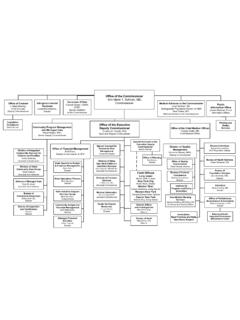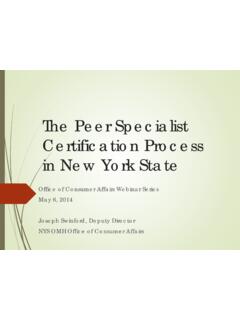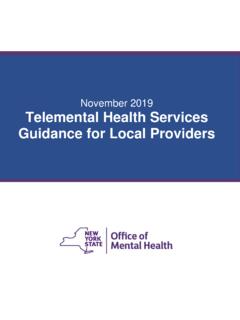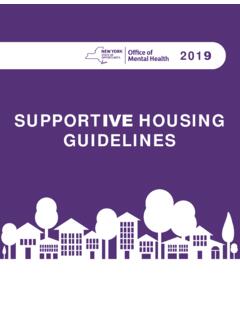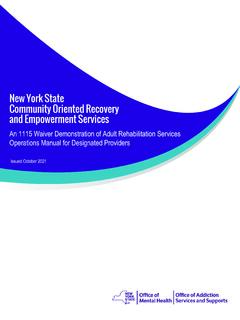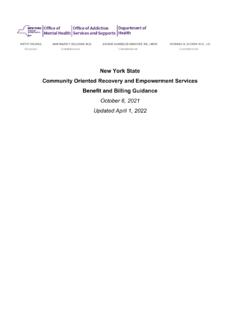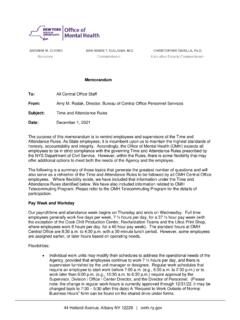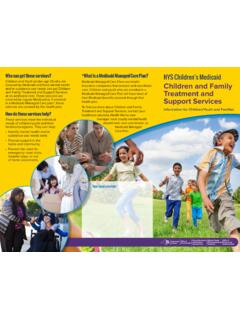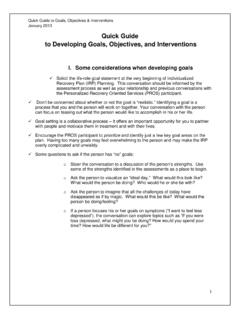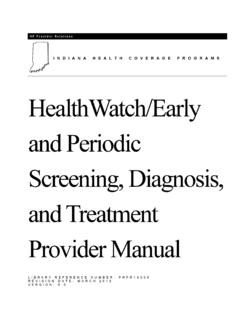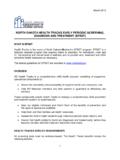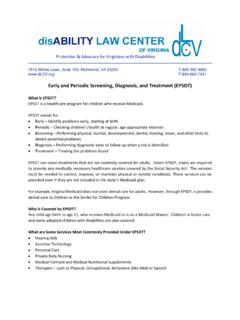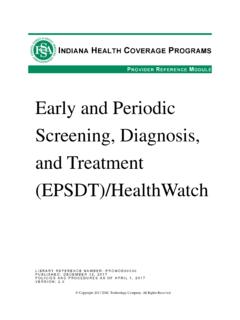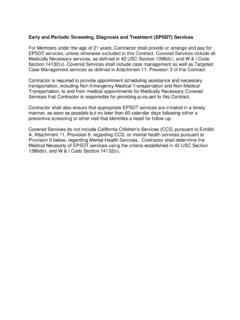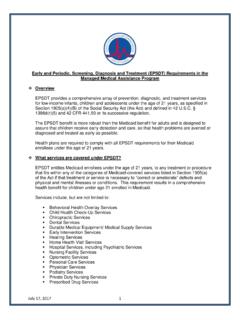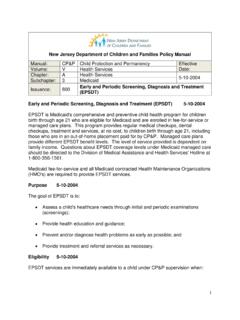Transcription of PART 511 EARLY AND PERIODIC SCREENING, …
1 1 PART 511 EARLY AND PERIODIC screening , DIAGNOSTIC AND TREATMENT SERVICES FOR CHILDREN (Statutory authority: Mental Hygiene Law , ; 42 1396d(r)(5); 18 NYCRR [ ] ) Section: Background and Intent Legal base Applicability Definitions Designation Process Guidelines Incorporation by Reference Background and Intent (a) Federal law requires state Medicaid programs to offer EARLY and PERIODIC screening , Diagnostic and Treatment to all Medicaid-eligible children under age 21. Commonly referred to as EPSDT, these services are designed to support childhood growth and development to ensure that children in low income families receive the comprehensive and preventive health and behavioral health services they need. EPSDT services include appropriate preventive, dental, health, behavioral health, developmental and specialty services. (b) Within the scope of EPSDT benefits under the federal Medicaid law, states are required to cover any service that is medically necessary to correct or ameliorate a defect, physical or mental illness, or a condition identified by screening and which are recommended by a Licensed Practitioner of the Healing Arts.
2 Thus, EPSDT requires states not only to screen and diagnose health and mental health illnesses or conditions in low income children, but they must ensure children are provided treatment as well. (c) New York State has obtained an amendment to its Medicaid State Plan that authorizes the provision of six new children s behavioral health and health services under the EPSDT benefit. When recommended by a Licensed Practitioner of the Healing Arts, these six services will be made available to any child eligible for Medicaid who meets relevant medical necessity criteria, and include: 2 (1) Crisis Intervention Services: services designed to interrupt and/or ameliorate a behavioral health crisis through the provision of support to an individual who may be experiencing a mental health crisis, and subsequently connecting such individual to appropriate resources. For purposes of this Part, provision of this services does not connote examination, diagnosis, care, treatment, rehabilitation, or training of a person with mental illness and thus does not constitute a nonresidential service requiring licensure under Mental Hygiene Law Section (2) Community Psychiatric Supports & Treatment: interventions intended to achieve identified goals or objectives as set forth in a treatment/recovery plan; (3) Family Peer Support Services: formal and informal services provided to families of a child experiencing social, emotional, developmental, medical, substance use, and/or behavioral challenges in their home, school, placement, and/or community; (4) Youth Peer Support and Training: formal and informal services and supports to ensure engagement and active participation of youth in the treatment planning and implementation process.
3 (5) Other Licensed Practitioners: service provided by a non-physician behavioral health practitioner operating within a licensed children s mental health agency, who is licensed in New York and is operating within a scope of practice defined in New York State law in any setting permissible under such law, including community based settings; and (6) Psychosocial Rehabilitation Services: task-oriented services designed to compensate for or eliminate functional deficits and interpersonal and/or behavioral health barriers associated with behavioral health needs. (d) This Part is intended to establish standards applicable to providers of mental health services licensed or operated by the Office of Mental Health that wish to be designated, or have been designated, as a provider of EPSDT [Crisis Intervention Services], Other Licensed Practitioners, and Community Psychiatric Supports and Treatment Services. (e) This Part also establishes standards applicable to non-licensed providers of mental health services that receive funding or have a contract from the Office that wish to be designated, or have been designated, as a 3 provider of any of the following EPSDT services: Crisis Intervention Services, Family Peer Support Services, or Youth Peer Support and Training and Psychosocial Rehabilitation Services.
4 Legal base (a) Section (a) of the Mental Hygiene Law charges the Commissioner of Mental Health with the responsibility for assuring the development of comprehensive plans, programs, and services in areas of research, prevention, care, treatment, rehabilitation, education, and training of persons with mental illness. (b) Section (c) of the Mental Hygiene Law gives the Commissioner of Mental Health the responsibility for seeing that persons with mental illness are provided with care and treatment, and that such care, treatment, and rehabilitation is of high quality and effectiveness. (c) Section of the Mental Hygiene Law grants the Commissioner of Mental Health the power and responsibility to adopt regulations that are necessary and proper to implement matters under his or her jurisdiction. (d) 42 1396d(r)(5) requires States to provide all medically necessary services that could be available under Medicaid to correct or ameliorate physical and mental illnesses and conditions that are detected in Medicaid-eligible children.
5 (e) 18 NYCRR [ ] establishes standards for the designation of qualified providers by the Department of Health to deliver EPSDT services under the New York State Medicaid program. Applicability (a) The provisions of this Part are applicable to all providers of mental health services licensed or operated by the Office of Mental Health that are seeking or have obtained designation from the Office to offer EPSDT [Crisis Intervention Services], Other Licensed Practitioner, and Community Psychiatric Supports & Treatment Services. (b) This Part applies to non-licensed providers of mental health services that received funding or have a contract from the Office that are seeking or have obtained designation from the Office to offer EPSDT Crisis 4 Intervention Services, Family Peer Support Services, Youth Peer Support and Training, and Psychosocial Rehabilitation Services. Definitions. For purposes of this Part: (a) Child means a person no more than 21 years of age.
6 (b) Crisis Event means an acute psychological/emotional change a child or family member is experiencing which results in a marked increase in personal distress and which exceeds the abilities and the resources of those involved ( , provider, family member) to effectively resolve it. (c) Cultural and linguistic competence means the ability of health care providers and health care organizations to understand and respond effectively to the cultural and language needs brought by a patient to a health care or behavioral health care encounter. (d) EPSDT means the Federal EARLY and PERIODIC screening , Diagnostic, and Treatment (EPSDT) benefit, which is a primary component of New York State s Medicaid program for children and adolescents. It affords a comprehensive array of preventive health care and treatments for Medicaid recipients from birth up until age 21 years. (e) Family means a child s primary caregiving unit, and is inclusive of a wide diversity of primary caregiving units such as birth, foster, adoptive, grandparents, siblings, other kinship caregivers, or a self-created unit of people with significant attachment to one another.
7 (f) Licensed Practitioner of the Healing Arts (LPHA) means the following professional staff: (1) Marriage and Family Therapist, which means an individual who is currently licensed as a Marriage and Family Therapist by the New York State Education Department; (2) Mental Health Counselor, which means an individual who is currently licensed as a Mental Health Counselor by the New York State Education Department; (3) Nurse Practitioner, which means an individual who is currently certified as a Nurse Practitioner by the New York State Education Department; 5 (4) Nurse Practitioner in psychiatry, which means an individual who is currently certified as a Psychiatric Nurse Practitioner by the New York State Education Department. For purposes of this Part, nurse practitioner in psychiatry shall have the same meaning as psychiatric nurse practitioner, as defined by the New York State Education Department; (5) Physician, which means an individual who is currently licensed as a Physician by the New York State Education Department or possesses a permit from the New York State Education Department; (6) Physician s Assistant, which means an individual who is currently registered as a Physician Assistant or a Specialist's Assistant by the New York State Education Department; (7) Psychiatrist, which means an individual who is currently licensed as a Physician by the New York State Education Department and who is certified by, or eligible to be certified by, the American Board of Psychiatry and Neurology; (8) Psychoanalyst, which means an individual who is currently licensed as a Psychoanalyst by the New York State Education Department.
8 (9) Psychologist, which means an individual who is currently licensed as a Psychologist by the New York State Education Department; (10) Registered Professional Nurse, which means an individual who is currently licensed as a Registered Professional Nurse by the New York State Education Department; and (11) Social Worker, which means an individual who is currently licensed as a Master Social Worker or Clinical Social Worker by the New York State Education Department. (g) Office means the Office of Mental Health. (h) State Agencies means and includes the New York State Office of Mental Health, the New York State Department of Health, the New York State Office of Children and Family Services, and the New York State Office of Alcoholism and Substance Abuse Services. 6 Designation Process (a) Providers of mental health services must receive prior approval by written designation of the Office to provide any or all of the following EPSDT services: (1) Crisis Intervention services are available to a child or a member of his/her family who is experiencing a behavioral health crisis event, and are designed to: (i) interrupt and/or ameliorate the crisis event; (ii) include an assessment that is culturally and linguistically competent; (iii) result in immediate crisis resolution and de-escalation; and (iv) result in the development of a crisis plan.
9 (2) Community Psychiatric Support and Treatment services, which include interventions intended to achieve identified goals or objectives as set forth in a treatment/recovery plan. (3) Family Peer Support services, which include formal and informal services to families of a child experiencing social, emotional, developmental, medical, substance use, and/or behavioral challenges in their home, school, placement, and/or community. (4) Other Licensed Practitioner services, which include services provided by the following professionals, operating within a licensed children s mental health agency, if currently licensed by State of New York to prescribe, diagnose, and/or treat individuals with a physical, mental illness, substance use disorder, or functional limitations at issue, provided such professionals are operating within their respective scope of practice and in a setting permitted under New York State law, including community settings: (i) Licensed Psychoanalyst; (ii) Licensed Clinical Social Worker; (iii) Licensed Marriage & Family Therapist; (iv) Licensed Mental Health Counselor; or (v) Licensed Master Social Worker under the supervision or direction of a Licensed Clinical Social Worker, a Licensed Psychologist, or a Psychiatrist.
10 7 (5) Psychosocial Rehabilitation services, which are task-oriented services designed to restore, compensate for, or eliminate functional deficits and interpersonal and/or behavioral health barriers associated with behavioral health needs. (6) Youth Peer Support and Training services are formal and informal services and supports to ensure engagement and active participation of youth in the treatment planning and implementation process. (b) Requests for designation to provide EPSDT services shall be made in a form and format established by the Office. (c) To be eligible for designation, the applicant must: (1) be enrolled in the Medicaid program prior to commencing service delivery; (2) have a demonstrated history of compliance with applicable federal and state laws and regulations governing the provision of mental health services; and (3) satisfy requisite criteria identified in the New York State Plan Amendment Designation Application and the standards of care identified in the Children s Health and Behavioral Health Services Transformation Medicaid State Plan Provider Manual.
